SEARCH BY TITLE
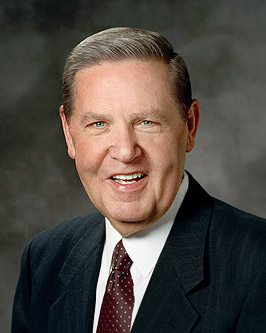 Be Not Afraid, Only Believe
Be Not Afraid, Only Believe
With uncompromised confidence in God, I ask you to summon full confidence in yourselves and build full confidence in your students by teaching with conviction and optimism that the gospel of Jesus Christ is the most certain, the most secure, the most reliable, and the most rewarding truth on earth and in heaven, in time and in eternity. I ask you to teach that nothing—not anything, not anyone, not any influence—will keep this Church from fulfilling its mission and realizing its destiny set from before the foundation of the world. Ours is that fail-safe, inexorable, indestructible dispensation of the fulness of the gospel. Our youth have no need to be afraid or tentative about themselves or about their future. What they do need to do is believe and to rise up to make the most of the remarkable day in which we live. . . Every teacher in this audience remembers the legendary story of Brother Karl G. Maeser taking a group of missionaries across the Alps by following a homely set of sticks positioned at crucial points on the path, marking the safe way of passage. The sticks weren’t much to look at—all of them irregularly shaped, some weathered and worn, none of them anything to write home about—but their placement, the course they marked, and the silent message their very presence communicated was the difference between life and death. Brother Maeser’s lesson that day was that these sticks were like the presiding Brethren of the Church—some tall, some short, a pretty homely bunch in a beauty contest—but following their path was to follow the path of safety. My point with you tonight is that this is what true doctrine (which is what the Brethren teach) does for us all day, every day. Someone has to plant those doctrinal guide posts. Someone has to say, “Here is the truth, and here is safety.” Someone has to guide the way of those who are traveling narrow, often dangerous paths, perhaps for the first time, as many of our high school- and college-age students will be doing. In The Church of Jesus Christ of Latter-day Saints, you are very prominent among the “someones” God has asked to mark the path of salvation. So, we must skillfully, compassionately share with an individual student, or with society, that course of safety, that sometimes narrow trail of truth, that firm foundation and sure footing upon which if they stand they cannot fall. And a student cannot stand on such sure ground if he or she does not know where it is, and they cannot know where it is unless parents and leaders and teachers like you lead them to it and walk that way with them.
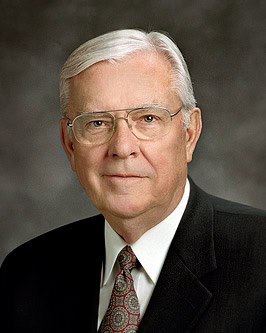 “Let Us Think Straight”
“Let Us Think Straight”
Let us not forget that approximately one-half of all of the teaching that takes place in the Church is done by sisters. Much of the leadership provided is from our sisters. Many service opportunities and activities are planned and directed by women. The counsel and other participation of women in ward and stake councils and in general councils at Church headquarters provide needed insight, wisdom, and balance. Elder Quentin L. Cook told about a life-changing role a stake Relief Society president had in Tonga. During a stake conference held while Elder Cook was there, the names of sixty-three prospective elders were sustained for ordination to the Melchizedek Priesthood. When Elder Cook asked how this “miracle” had been accomplished, the stake president told him that in a stake council meeting, the stake Relief Society president spoke of many men in their late twenties and early thirties who had not served missions and who were in various stages of activity. She suggested that the council focus on priesthood ordinations and temple ordinances for them as well as for their wives—some of whom were less active or not members. “As she spoke, the Spirit confirmed to the [stake] president that what she was suggesting was true,” Elder Cook related. It was decided that the men of the priesthood and the women of the Relief Society would reach out to rescue these men and their wives. . . . Those involved in the rescue focused primarily on preparing them for the priesthood, eternal marriage, and the saving ordinances of the temple. During the next two years, almost all of the 63 men who had been sustained to the Melchizedek Priesthood at the conference I attended were endowed in the temple and had their spouses sealed to them. This account is but one example of how critical our sisters are in the work of salvation.
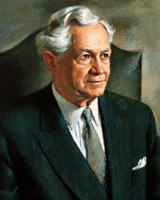 The Nature of Man and God
The Nature of Man and God
I am grateful for membership in a church whose religion fits men for the struggle with the forces of the world and enables them to survive in this struggle. One of these acting forces is the responsibility of teaching and the opportunity afforded in this church for our local officers — stake presidencies, bishoprics, priesthood quorums, and others — to share in this responsibility. The obligation of teaching is placed by the Church first upon the parents, and the responsibility thereof has been placed upon them by divine command. But besides parents, there are tens of thousands of men and women who have accepted the responsibility of leading and teaching the young and the adults. In the priesthood quorums alone the number runs into many thousands. And if we add mothers and fathers, general officers, and young men and women in the Sunday School, the Mutual Improvement Associations, the Primary, the seminaries, and women in the Relief Society, we have an army of teachers who have the privilege and responsibility of exercising what Martin Luther calls “one of the highest virtues upon earth.” . . Think what the Church is doing to help this army of leaders and teachers as individuals to become strong in the battle against the forces of the world! First, it places upon them the obligation of teaching their fellowmen by example, and there is no better safeguard placed upon an honest man or a sincere woman. Second, it develops the divine attribute of love for others. . . The third requirement is purity of life. I cannot imagine an impure person teaching purity to young boys and girls. I cannot imagine one who has doubt in his mind about the existence of God impressively teaching the existence of Deity to young boys and girls. He cannot do it! If a leader or a teacher acts the hypocrite and attempts so to lead and teach, what he is will speak louder than what he says; and that is the danger of having doubting men as leaders and teachers of our children.
 A Teacher Came From God
A Teacher Came From God
In recent months President Gordon B. Hinckley has called on us to hold our people close to the Church, especially the newly converted member. In issuing this call President Hinckley has reminded that we all need at least three things to remain firmly in the faith—a friend, a responsibility, and “[nourishing] by the good word of God.” Inspired instruction in the home and in the Church helps provide this crucial element of nourishing by the good word of God. We are so grateful to all who teach. We love you and appreciate you more than we can say. We have great confidence in you. To teach effectively and to feel you are succeeding is demanding work indeed. But it is worth it. We can receive “no greater call.” Surely the opportunity to magnify that call exists everywhere. The need for it is everlasting. Fathers, mothers, siblings, friends, missionaries, home and visiting teachers, priesthood and auxiliary leaders, classroom instructors—each is, in his or her own way, “come from God” for our schooling and our salvation. In this Church it is virtually impossible to find anyone who is not a guide of one kind or another to his or her fellow members of the flock. Little wonder that Paul would say in his writings, “God hath set some in the church, first apostles, secondarily prophets, thirdly teachers.” For each of us to “come unto Christ,” to keep His commandments and follow His example back to the Father is surely the highest and holiest purpose of human existence. To help others do that as well—to teach, persuade, and prayerfully lead them to walk that path of redemption also—surely that must be the second most significant task in our lives. Perhaps that is why President David O. McKay once said, “No greater responsibility can rest upon any man [or woman] than to be a teacher of God’s children.”
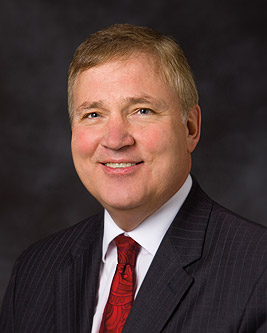 Teaching with the Power and Authority of God
Teaching with the Power and Authority of God
You have been called by the spirit of prophecy and revelation and have been set apart by priesthood authority. What does this mean? First, it means that you are on the Lord’s errand. You are His agent, and you are authorized and commissioned to represent Him and to act on His behalf. As His agent, you are entitled to His help. You must ask yourself, “What would the Savior say if He were teaching my class today, and how would He say it?” You must then do likewise. This responsibility may cause some to feel inadequate or even somewhat fearful. The pathway is not difficult. The Lord has provided the way for every worthy Latter-day Saint to teach in the Savior’s way. Second, you are called to preach the gospel of Jesus Christ. You must not teach your own ideas or philosophy, even mingled with scriptures. The gospel is “the power of God unto salvation,” and it is only through the gospel that we are saved. Third, you are commanded to teach the principles of the gospel as they are found in the standard works of the Church, to teach the words of modern-day apostles and prophets, and to teach that which is taught you by the Holy Ghost. So where do we begin? Our first and foremost responsibility is to live so that we can have the Holy Ghost as our guide and companion. When Hyrum Smith sought to become engaged in this latter-day work, the Lord said, “Behold, this is your work, to keep my commandments, yea, with all your might, mind and strength.” This is the starting point.
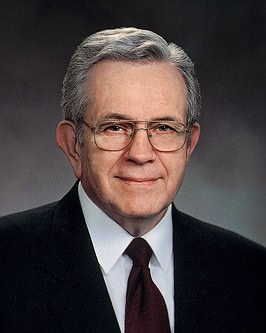 The Unwritten Order of Things
The Unwritten Order of Things
I speak to you today as a teacher. I reflect the influence of a teacher that I knew more than fifty years ago. As is often the case, the influence of that teacher did not center on the subject he taught. Dr. Schaefer was a professor of mathematics at Washington State University at Pullman, Washington. He was quite unimpressive in appearance. I don’t remember his first name, but I shall never forget the first thing he said the first day we met.It was during World War II. We were in pilot training and had been sent to the university for what we were told would be a crash course in meteorology, weather, navigation, physics, aerodynamics, and other technical subjects. We thought the title “Crash course” was not very encouraging to student pilots. The word intense would have been better. The pressure was enormous because those who failed the course would be washed out of the pilot program. I was in competition with cadets, many of whom had been to college; some of them had had some advanced training, while I had barely escaped from high school. Dr. Schaefer was to take us from basic mathematics through calculus in just a matter of weeks. I thought it was hopeless, until that first few minutes in the first class. He began the class with this announcement: “While many of you have had some college, even advanced courses in what we are to study, it will be my purpose to teach the beginners. I am asking those of you who know the subject to be patient while I teach the basics to those who do not.” Encouraged by what he said and more by how he taught, I was able to pass that course with reasonable ease. It might otherwise have been impossible. . . I will be speaking about what I call the “unwritten order of things.” My lesson might be entitled “The Ordinary Things about the Church Which Every Member Should Know.” Although they are very ordinary things, they are, nevertheless, very important! We somehow assume that everybody knows all the ordinary things already. If you do know them, you must have learned them through observation and experience, for they are not written anywhere and they are not taught in classes. So, as we continue, if you are ones that know it all, be patient while I teach those who do not–and take a nap. The basic foundation of knowledge and testimony never changes–the testimony that God the Father lives, that Jesus is the Christ, that the Holy Ghost inspires us, that there has been a restoration, that the fullness of the gospel and the same organization that existed in the primitive church have been revealed to us. Those things are taught everywhere and always–in our classes, the scriptures, the handbooks and the manuals–in everything we do.
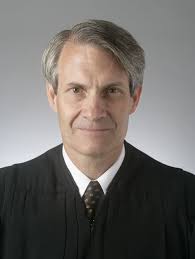 The Very Root of Christian Doctrine
The Very Root of Christian Doctrine
We laid down a rule that every sacrament meeting talk and every lesson in Sunday School, Relief Society, and priesthood meetings must be related to the Atonement of Christ in a direct and express way. Our goal was to have all of our meetings filled with “life [and] substance [and] redemption” by having them connected to “the very root of Christian doctrine”: the Atonement of Christ. We told the bishops that if they wanted a sacrament meeting about the principles of emergency preparedness—important principles, to be sure—that meeting would be about “Emergency Preparedness and the Atonement of Christ.” If you cannot figure out the link between the topic you are to teach and the Atonement of Christ, you have either not thought about it enough or you shouldn’t be talking about it at church. . . We tried to link every principle taught in our meetings to the Atonement in a direct and express way. Now that isn’t hard to do in sacrament meeting, because the bishopric can pick the topics. And it isn’t hard to do when the study guide lesson is on the Atonement or repentance. But what do you do when the study guide lesson is on tithing or visiting teaching or the value of education? That’s a little tougher. We made it clear that we expected the teachers to teach the approved curriculum. There is strength that comes from teaching materials approved by priesthood leaders. But it isn’t always obvious how the assigned material relates to the Atonement. To address that challenge, we had two suggestions. First, we urged teachers to find examples of the principles being taught from the life of Christ. When we are talking about His life and using the words He said, we are remembering Him, and a power comes into our teaching that is otherwise not present. Second, we encouraged teachers to see how the principle taught was either part of Heavenly Father’s effort to draw us closer to Him through Christ (the vertical pull of the Atonement) or a principle that could draw us closer to our fellow humans through Christ (the horizontal pull of the Atonement). So, how did it work? Pretty well. People got excited about this approach. We didn’t think there was any way that we could—or even should—try to measure its value, but it seemed right, so we pressed forward. Why did it feel right? Why did it taste so good to—using the words of Nephi—“talk of Christ, . . . rejoice in Christ, [and] preach of Christ” in all of our meetings? Because when we are speaking of what the Savior has done for us, we are at the core of the meaning of life, we are connected to “the very root of Christian doctrine,” and we are doing what Christ and His prophets have asked us to do.
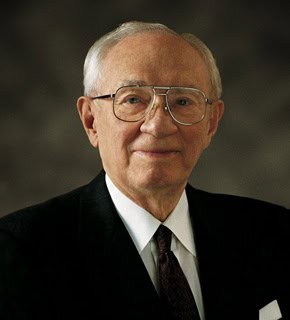 Your Greatest Challenge, Mother
Your Greatest Challenge, Mother
I know of no better answer to these foul practices that confront our young people than the teachings of a mother, given in love with an unmistakable warning. There will be failures, yes. There will be heartbreaking disappointments. There will be tragedies, bleak and hopeless. But in very many cases, if the process begins early and continues there will be success and happiness and love and much of gratitude. Opening your purse and handing a son or daughter money before you rush off to work will not do. It may only lead to more evil practice. The proverb spoken of old said, “Train up a child in the way he should go: and when he is old, he will not depart from it” Another wise saying reads, “As the twig is bent, so the tree’s inclined”. Teach your children when they are very young and small, and never quit. As long as they are in your home, let them be your primary interest. I take the liberty tonight of suggesting several things that you might teach them. The list is not complete. You can add other items.
